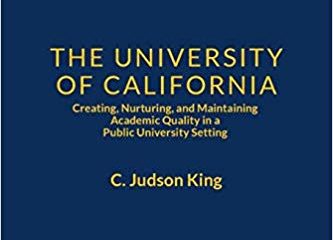Posts by Catherine Mitchell
-
UC Press and eScholarship Launch UC Publishing Services program
UC Press and CDL’s eScholarship program are pleased to announce the launch of UC Publishing Services (UCPUBS). Leveraging the expertise of both the Press and eScholarship Publishing, UCPUBS offers a broad range of publishing solutions aimed at supporting the traditional and open access publishing needs of editorially independent publishing programs within the University of California system. UC Publishing Services provides scalable publishing solutions and infrastructure to organized research units, departments, and other UC affiliates wishing to manage their book series and imprints, journals, and other kinds of academic content. Together, UC Press and eScholarship Publishing produce and disseminate approximately 200 […]
-
Pathways to Open Access: Library Publishing/Repository Services and CDL
The Pathways blog series highlights CDL’s efforts on various pathways to open access and illustrates how diverse approaches can complement and reinforce each other–and how they can raise productive tensions that push us to think more critically about the work we do. We believe this kind of approach can move us toward true and comprehensive transformation of the scholarly communications landscape. What is the strategy described in this post? This post discusses the California Digital Library’s eScholarship Publishing and Repository Services as core pathways to open access at the University of California. Ellen Finnie’s prior post in this series focused on the […]
-
eScholarship celebrates its 20-year anniversary!
The University of California’s eScholarship publishing and institutional repository program celebrates its 20-year anniversary this year, a milestone that provides us with an opportunity to reflect on how far UC has come in the work of open access library publishing and to consider all the work there is yet to do. The eScholarship repository platform was launched by the California Digital Library (CDL) in collaboration with the UC libraries in April 2002, the year before Arnold Schwarzenegger’s election as governor of the state of California and three years before the establishment of the UC Merced campus. Born of consultations with […]
-
Next Gen Library Publishing partnership awarded $2.2M Arcadia grant to improve scholarly publishing infrastructure
Educopia Institute and California Digital Library are pleased to announce an award in the amount of $2,200,000 from Arcadia—a charitable fund of Lisbet Rausing and Peter Baldwin—in support of the “Next Generation Library Publishing” project. Through this project, Educopia and its partner institutions—California Digital Library (CDL), Confederation of Open Access Repositories (COAR), Longleaf Services, LYRASIS, and Strategies for Open Science (Stratos)—will provide new publishing pathways for authors, editors, and readers by advancing and integrating open source publishing infrastructure to provide robust support for library publishing. “The costs of creating and accessing scholarship have soared in recent years. Library publishers seek […]
-
Academy-owned? Academic-led? Community-led? What’s at stake in the words we use to describe new publishing paradigms
Editor’s note: This blog post is cross-posted from the Library Publishing Coalition (LPC) blog and is LPC’s official contribution to Academic Led Publishing Day (ALPD), a global digital event to foster discussions about how members of the scholarly community can develop and support academic-led publishing initiatives. LPC is participating in ALPD because it presents an opportunity to have a multi-stakeholder discussion about an issue of growing importance to libraries, and to call attention to the lack of a shared vision in this critical area. Our goals in this post are to highlight some of the unresolved questions in this space and to […]
-
Interview with Jud King: an author’s perspective on the rewards and challenges of open access book publishing
Jud King is Provost and Senior Vice President, Emeritus of UC, as well as former Provost – Professional Schools and Colleges, Dean of the College of Chemistry, Director of the Center for Studies in Higher Education, and Professor Emeritus of Chemical and Biomolecular Engineering at Berkeley. He has recently written a book¹ on the entire University of California, exploring “the structural, policy, operational, and environmental matters that have contributed to [its] success…” Published by the Berkeley campus Center for Studies in Higher Education in January, 2018, the book is both open-access and, essentially, self-published. We asked Jud to reflect on […]
-
Does the UC Open Access Policy miss the mark? Depends on which mark.
Institutional open access policies often get a bad rap. Critics point to their lack of “teeth”; their poor compliance rates; their failure, thus far, to effect substantial change within the economically unsustainable and locked down scholarly publishing environment. Motivated by the desire to free all scholarship from publisher access restrictions and the equally ambitious goal of empowering all authors to retain rights to their scholarly publications, these policies struggle mightily under the weight of expectations. But maybe we are expecting too much — or not enough.






